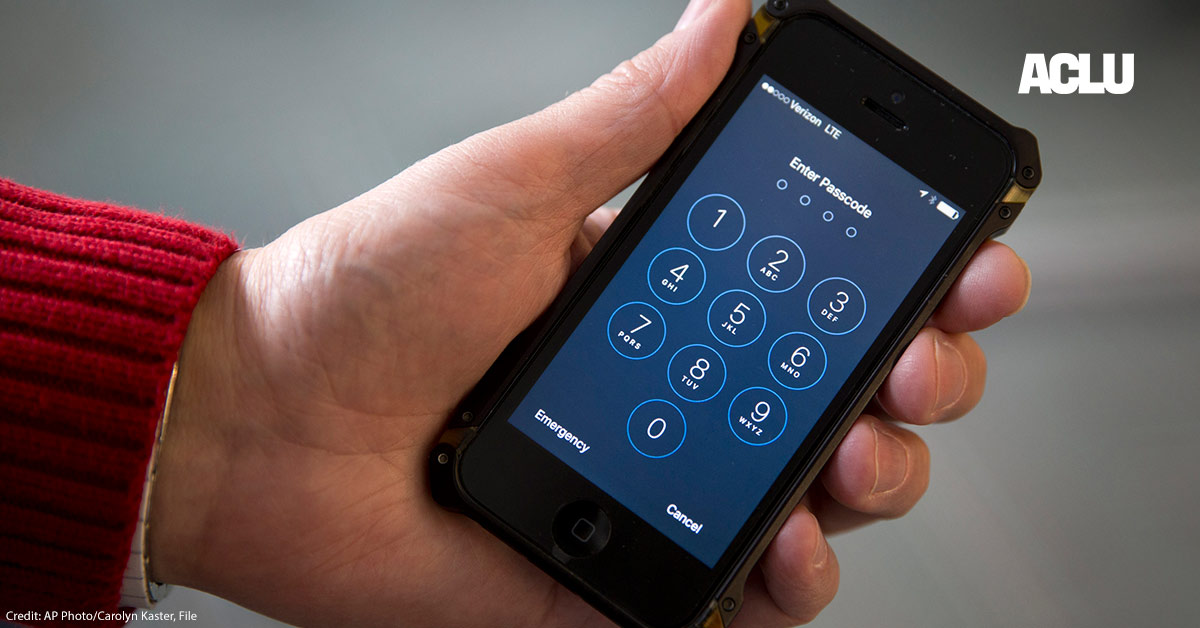

A federal circuit court rightly found the government may not hold on to our digital devices or data indefinitely.

Jennifer Stisa Granick,
Surveillance and Cybersecurity Counsel, ACLU Speech, Privacy, and Technology Project
We’ve all seen enough police procedurals to know the ordinary flow of a criminal investigation: first, law enforcement develops suspicion; then, it gets a warrant and seizes evidence, like a cellphone or computer, from a suspect; and finally, there is a trial. But sometimes in real life, instead of winding down like an hour-long episode on A&E, that final act is delayed or never happens. If a case drags on, or there is no case, can the government hold onto the digital devices in its possession and the reams of private information they contain for as long as it wants?
Surprisingly, courts have barely addressed this question, let alone answered it definitively. But last month, in a case involving Mike Lindell — that’s the “MyPillow” founder now best known for purveying unsupported skepticism about the outcome of the 2020 election — the Eighth Circuit Court of Appeals offered an answer.
The court ruled that even when the government seizes and then searches a cellphone under a lawful warrant, the Fourth Amendment bars it from holding onto the device, or all of the data stored there, indefinitely, just because it might be useful in the future. Instead, the government must offer clear reasons to justify any ongoing retention. Further, the Eighth Circuit held that the Constitution requires courts to weigh the government’s rationale for keeping seized property against the owner’s interest in having that property returned — a substantial interest, given the sheer breadth and volume of sensitive information that cellphones contain.

Courts are starting to scrutinize free-wheeling searches of the libraries’ worth of private information stored on our electronic devices.
Source: American Civil Liberties Union
This is a sensible conclusion with important implications for how courts will regulate cellphone seizures and searches going forward. To ensure that respect for constitutional rights is not left up to government agents’ discretion whenever our devices are seized, courts should follow the Eighth Circuit’s lead in subjecting prolonged retentions of digital property to judicial oversight.
In Lindell’s case, in the course of investigating an alleged breach of election equipment in Mesa County, Colorado, federal agents seized his cellphone. They had a warrant permitting them to search the phone for evidence of the specific crimes under investigation. Before charges were filed, Lindell brought a civil lawsuit challenging various aspects of the government’s probe. Among other things, Lindell requested a court order mandating the return of his cellphone and all its data. The government asserted that, once property is lawfully seized, it may be retained indefinitely based on its mere assertion of an “ongoing evidentiary need.”
This argument failed before the Eighth Circuit. The court reasoned that the Fourth Amendment’s protection of individuals from unreasonable interference by government agents does not simply expire once law enforcement obtains a warrant to lawfully search private property. The court first acknowledged the Supreme Court’s recognition, in a series of strong privacy decisions over the past decade, that our digital devices “implicate privacy concerns far beyond those of other items.” It then observed that the comprehensiveness of the information stored on our cellphones, coupled with the practical realities of digital searches, which often involve initially seizing all the information on a device, means that such seizures almost always involve “an overbroad capture of information.”
As a result, when the government seizes information beyond the scope of demonstrated probable cause (and no other exception to the warrant requirement applies), Fourth Amendment rights are at stake. The government can copy the data and search it in a manner designed to safeguard confidential, private, and privileged materials. But the government must also substantiate its ongoing retention of lawful property by identifying a governmental interest that outweighs the target’s privacy and property interests in the device and the original data, or give them back.
The Eighth Circuit’s conclusion has been received by some experts as somewhat novel, but it did not come out of nowhere. In fact, it’s a logical step from positions the ACLU has advocated in other cases. In friend-of-the-court briefs, we’ve long argued, and various courts have agreed, that individuals retain Fourth Amendment protections for the information police lawfully seize pursuant to a warrant, and that overly-long data retentions can violate people’s reasonable expectation of privacy and property interest in our digital information.
In one 2015 case that ended up before the full U.S. Court of Appeals for the Second Circuit, the government seized a device in connection with one criminal investigation which fizzled out, but then held onto and searched that device years later to investigate a separate crime, without ever seeking a second warrant. We argued that the continued retention of the device violated the Fourth Amendment, in part because if it did not, every seizure of digital information would tempt police into a freewheeling general search. (The full Second Circuit avoided taking a side, ultimately ruling that the answer didn’t matter under the so-called “good-faith doctrine” — another target of ACLU ire in recent years.)
Lindell’s case shows that a person retains a Fourth Amendment interest in their property, including their data, even after an initial, lawful seizure. Even if courts limit police access to this information by cabining searches and imposing use restrictions on non-responsive data — and they should do both — there remains an independent privacy and property interest in how our records are analyzed, stored, and shared after they enter government hands.
Exactly when the government’s ability to retain and access the data becomes unreasonable under the Fourth Amendment is an open and genuinely difficult question. The constitutional command that searches and seizures be “reasonable” means that there will, of course, be gray areas. That’s nothing new. A person’s continuing interest in their phone and the libraries’ worth of personal information it stores should place a heavy thumb on the scale in their favor. And generally, the longer the government wants to hold onto a phone, the more it should have to prove to justify its continued possession. Further, only specific reasons, rather than a generalized assertion of convenience or hypothetical value in the future, should form the basis for continued retention by the government.
Especially as storage of digital information becomes ever cheaper, the prospect that the government might indefinitely retain the bounty of private data that it can gather by seizing a cellphone is alarming. The Eighth Circuit’s opinion goes a long way to preventing the government from holding on to data indefinitely, creating digital dossiers it can use at its discretion in unrelated investigations or years later.
We’ll all be able to sleep more soundly if courts begin to apply these principles, no matter what pillow we use.